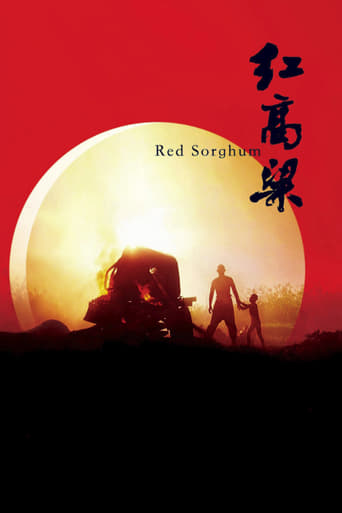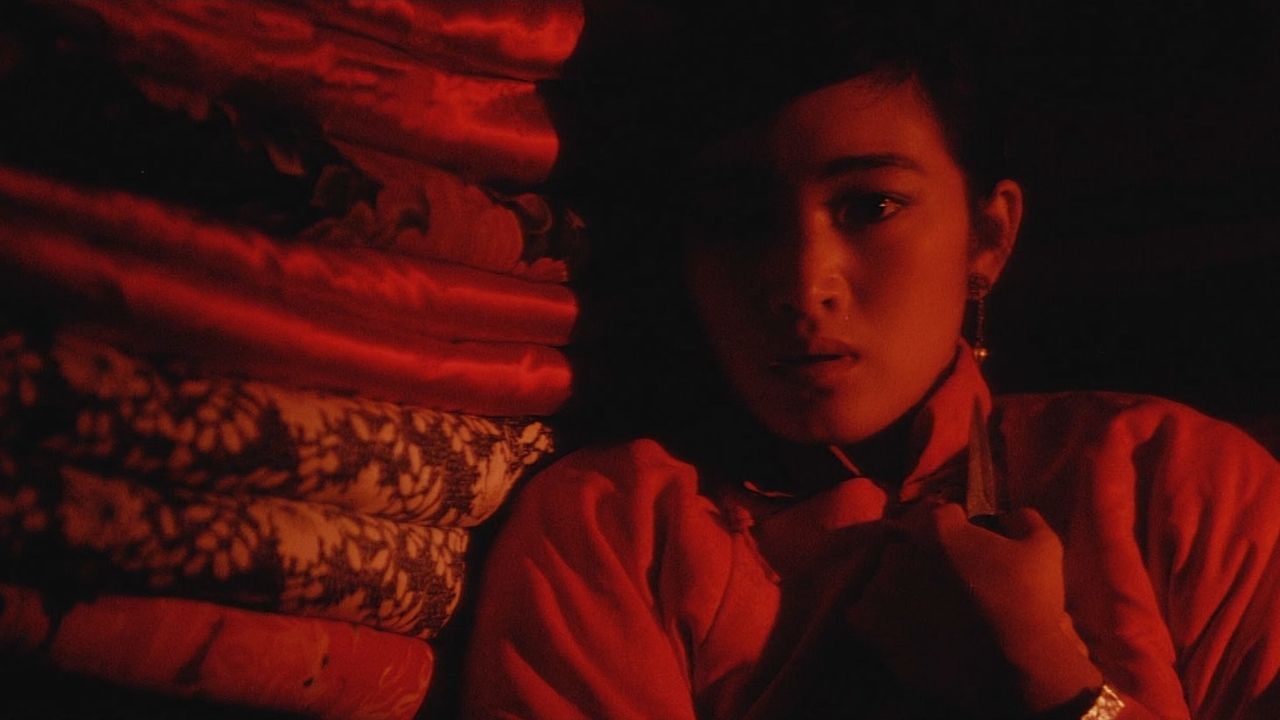SnoopyStyle
It's 1930s China. Jiu'er (Li Gong) is sent by her father to marry the leper winery owner Li Datou. On the way there, there are fields of red sorghum growing wild. She goes home to deliver the mule from Li Datou. She is taken out into the fields by Luohan where they have sex. Li Datou is killed by an unknown assailant and the winery is left to Jiu'er. Luohan returns drunk and making demands on her. He is thrown out. After he sobers up, he urinates into the wine and picks her up like in the field into her home. Surprisingly, the urine wine turns out to be the best ever. That night Luohan leaves and Jiu'er has a child. Nine years later, Luohan returns and the Japanese arrive.It starts off as a funny quirky film. It has moments of originality. When the Japanese come, the movie goes to another gear and another level. It's jarring and compelling. The red color infiltrates everything like the film itself is bleeding. Li Gong makes a terrific debut. The final orgy of violence is shocking.
GyatsoLa
This is the first film from Zhang Yimou and Gong Li, the launch pad for a series of superb films which introduced many in the West to modern Chinese cinema. It is the story of a young woman who marries a dying man and then inherits his winery (actually a distillery) famed for its Baiju (red sorghum spirit). The story is simple, with little dialogue, helped along by a near continuous voice-over of a storyteller. Normally this would be an intrusive device, but somehow it works for such a visual film which aspires to an almost epic scale. I can't help thinking Zhang may have been influenced by Terrence Malick films like Badlands and Days of Heaven. But it is certainly an original and striking debut, if not quite as good as his later masterpieces, Ju Dou and Raise the Red Lantern. Of course, what all three of those films share is a near obsession with primary colours, but for visual effect and symbolism.Gong Li of course is charismatic and luminous, it can never have been a doubt from this film onward that she would be a star. But the real star here is the lush, erotic photography. It is a bit of a pity that the final third of the film loses its focus somewhat and becomes a more conventional melodrama. But that is forgivable for a film made in the circumstances. It still holds up very much as a film worth watching.
Jackson Booth-Millard
I had no idea about the meaning of the title, I found out while watching it that sorghum is a cereal grass, like corn or barley, with a tall stem bearing grain in a cluster, anyway, I watched it because it featured in the book 1001 Movies You Must See Before You Die, the debut film from director Yimou Zhang (Hero, House of Flying Daggers). Basically, set in 1930's in China, a young woman called Jiu'er has been bought by a leper who owns a winery and is to marry, but he dies before the ceremony can take place. Also not long before the death and the ceremony she met and fell for one of his servants, known only as Nine - My Grandma (Li Gong), and together they take over the winery. They seem also to form a peaceful mostly female community with Jiu'er as head of the isolated business, which obviously makes wine using the crop of sorghum. The area is invaded though by Japanese intruders who try to rule and make way for a road, meaning that they will cut down all sorghum in the fields, but the villagers rise up and go against them to save their treasured crop that is set to grow. Also starring Wen Jiang as Yu - My Grandpa, Rujun Ten as Uncle Liu Luohan, Liu Jia as My Father, Qian Ming as Nine's Father, Ji Chunhua as Bandit Sanpao and Zhai Chunhua as Hu Er. I will be honest and say that the majority of the first half of the film with the wedding preparations I understood pretty well, the other half I admit I did not pay close attention and lost track of a little, but the costumes and landscapes are filled with great bright colour, and there are some long takes as well, so it certainly looks a fabulous film, it is an interesting and watchable drama. Very good!
Dennis Littrell
Although I don't think this is quite as good as some of the other films that master Chinese film maker Zhang Yimou has made--e.g., Raise the Red Lantern (1991); The Story of Qiu Ju (1991); Ju Duo (1990)--Red Sorghum is nonetheless an outstanding film strikingly presented visually and thematically.Gong Li stars as the betrothed of an old leprous wine maker. The film opens with her being carried in a covered sedan chair to the consummation of her wedding by a rowdy crew from the sorghum winery. It is the 1930s or a little before. They joust her about according to tradition and sing a most scary song about how horrible her life is going to be married to the leprous old man. Through a break in the sedan's enclosure as she sits alone in fear and dread she catches sight of Jiang Wen, a burly, naturalistic man with a piercing countenance. A little later after a bit of unsuccessful highway robbery during which she is released from her confinement, they exchange meaningful glances. The young man doing the voice-over identifies them as his Grandmother and Grandfather. (Obviously the leprous old man is going to miss out!)Zhang Yimou's technique here, as in all of his films that I have seen, is to tell a story as simply as possible from a strong moral viewpoint with as little dialogue as possible and to rely on sumptuous sets, intense, highly focused camera work, veracious acting by a carefully directed cast, and of course to feature the great beauty of his star, the incomparable and mesmerizing Gong Li. If you haven't seen her, Red Sorghum is a good place to start. Jiang Wen is also very good and brings both a comedic quality to the screen as well as an invigorating vitality. His courageous and sometimes boorish behavior seems exactly right.I should warn the viewer that this film contains striking violence and would be rated R in the United States for that and for showing a little boy always naked and for the "watering" of the wine by Jiang Wen and the boy. Indeed the film is a little crude at times and represents a view of pre-communist China and its culture that the present rulers find agreeable. The depiction of the barbarity and cruelty of the Japanese soldiers is accurate from what I know, but I must say that this film would never have seen the light of day had communist soldiers been depicted in such a manner.Nonetheless the treatment is appropriate since Red Sorghum is a masculine, lusty film suggesting the influence of Akira Kurosawa with perhaps a bit of Clint Eastwood blended in. There are bandits and tests of manhood. The men get drunk and behave badly. Masculine sexual energy is glorified, especially in the scene where Jiang Wen carries Gong Li off to bed, holding her like a barrel under his arm, feet forward, after having "watered" her wine as though to mark his territory. The camera trailing them shows her reach up and put her arms around his neck and shoulder as much in sexual embrace as in balance.Obviously this is Zhang Yimou before he became completely enamored of the feminist viewpoint; yet somehow, although Gong Li is allowed to fall in love with her rapist (something not possible in contemporary American cinema), Zhang Yimou manages to depict her in a light that celebrates her strength as a woman. One can see here the germination of the full blown feminism that Zhang Yimou would later develop in the aforementioned Raise the Red Lantern, Ju Dou and Qiu Ju. As usual in Zhang Yimou's films not only are the sets gorgeous but the accompanying accouterments--the pottery, the costumes, the lush verdure of the sorghum fields, even the walls and interiors of the meat house restaurant/bar and Gong Li's bedroom--are feasts for the eyes, somehow looming before cinematographer Gu Changwei's camera more vividly than reality. There are some indications here however that Zhang Yimou had not yet completely mastered his art, and indeed was working under the constraint of a limited budget. For example there was no opening in the sedan through which Gong Li could see Jiang Wen, and there shouldn't have been one (a peephole maybe). The pouring of the wine (into presumably empty bowls that obviously already contained wine) by Jiang Wen needed more practice. In his later films Zhang Yimou would reshoot such scenes to make them consistent with the audience's perception. Additionally, Gong Li's character was not sufficiently developed early on for us to appreciate her confident governance of the winery she had inherited. "Uncle" Luohan's apparently jealous departure from the winery and his implied relationship with and loyalty to Gong Li were also underdeveloped.However these are minor points: in what really matters in film making--telling a story and engaging the audience in the significance and the experience of the tale--in these things Zhang Yimou not only excelled, but gave promise of his extraordinary talent that would be realized in the films to come. See this by all means, but don't miss his Raise the Red Lantern, in my opinion one of the greatest films ever made.(Note: Over 500 of my movie reviews are now available in my book "Cut to the Chaise Lounge or I Can't Believe I Swallowed the Remote!" Get it at Amazon!)


 AD
AD

